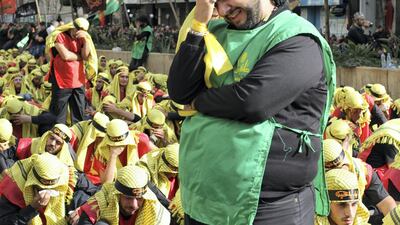For those with an interest in classics, Project Cassandra sounds like an exercise in futility: crying foul over a threat that would be wrongly dismissed as bogus.
In fact the US government's axed decade-long programme to confront global drug smuggling and organised crime activities by Hizbollah did address and contain a real scourge. Until the former US leader Barack Obama, like the Greek gods in the myth, dropped the ball.
Part of the price the US voluntarily paid for the 2015 Iran nuclear deal was that Cassandra was wound up. With his successor now looking at ways to nullify Mr Obama's concessions to Tehran, Project Cassandra must be relaunched in a new and improved effort to target the group.
Against the backdrop of renewed protests in Iran, Donald Trump faces another key decision point in mid-January that will determine the viability of the agreement. It is expected that the Republican president will decouple sanctions relief from the bargain, a decision that will leave Iran dependent on Europe for the concessions it believed it secured in return for freezing nuclear activities.
There are other big blows to land on Iran. One would be to reinvigorate the campaign against the lucrative criminal networks operated by Iran's proxies around the world. The first phase of Cassandra proved that the underground activity is coordinated at the highest levels in Tehran and Beirut.
As a first step Mr Trump should nominate and empower a new head of the Drug Enforcement Agency - the post is currently vacant - to make make Hizbollah a top priority. The group is not just a Lebanese phenomenon and it should not be protected by the realpolitik of its domestic political position. Its outside reach beyond the country is after all a huge card for Tehran.
It has been a leading actor in boosting Iranian influence in Syria and Iraq. And it has been the backbone of the Iranian project throughout the world.
There are other advantages Iran has taken from the nuclear agreement. It benefited massively from the plane loads of cash that Mr Obama dispatched to the country after 2015. It has gained similar advantages from the easing of sanctions in Europe and America. Increased oil sales also helped cover up economic mismanagement.
But emboldened by extra resources it turned up the aggression abroad. And this is where Hizbollah is so important. If Mr Trump additionally designates Hizbollah as a first rank transnational criminal organisation on a par with the Italian and Russian mafia groups, the US Treasury would gain full scope to go after money laundering activities by banks dealing with group.
Incredibly Hizbollah not only organises and profits from organising shipments of drugs from South America to the US, its members also have a free run at shifting money though the regional banks.
Since the takedown of Al Capone, the US prosecutors have unrivalled appetite to use financial violations to tackle crime and racketeering. In recent years this has meant that the US was able to tackle corruption in Fifa.
_____________________
Read more from Opinion
Four things we have learnt about the world in the past 12 months
The Year of Giving has fostered solidarity and broadened our understanding of benevolence
Why Pakistan's ex-army chief is the man to lead the terror alliance
_____________________
Unleashing that force against Iran and its allies would have tremendous effect on the resources that are used to promote and extend Iran's influence. At the very least the regime should have to fund its activities from its own resources.
That could cause the Iranian people to question the cost of it extra-territorial adventures which have caused so much damage elsewhere.
One test for the effectiveness of the Trump approach would be the fortunes of Abdullah Safieddine, alleged by the DEA to be the linchpin of the Hizbollah drug operations. Not coincidentally Safieddine is Hizbollah’s Tehran-based liaison with Iranian regime.
Using the Kingpin Act to target his activities would also have a worldwide impact on the Hizbollah network. The tools available to the US government even include the Financial Action Task Force which could blacklist countries that shelter or condone Hizbollah activities from international financial markets.
That would send a significant signal to the Latin American countries on the cost of hosting Hizbollah.
The running theme of Mr Trump’s new National Security Strategy published in December that America faces a new era of multi-faceted competition for power. In light of this, a new activist policy against Hizbollah would be a significant marker of Washington’s intent.
Until Mr Obama decided to go easy on Iran, the US was using its financial power as a constraint on Iran. If Mr Trump re-embraced the strategy, he would have the means to significantly challenge Iran.
He would also be pursuing a principle that could be adapted to restraint other US competitors. Put simply it would ensure states could not expect to pursue anti-US goals while fully funded through the capitalist system.

